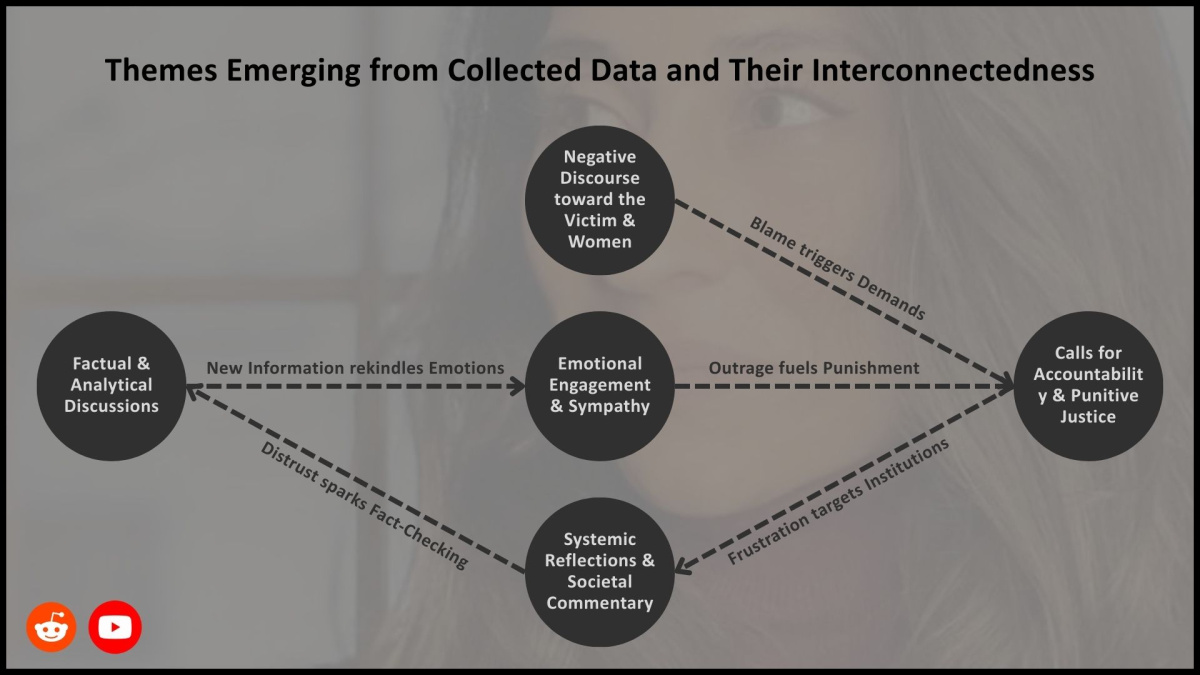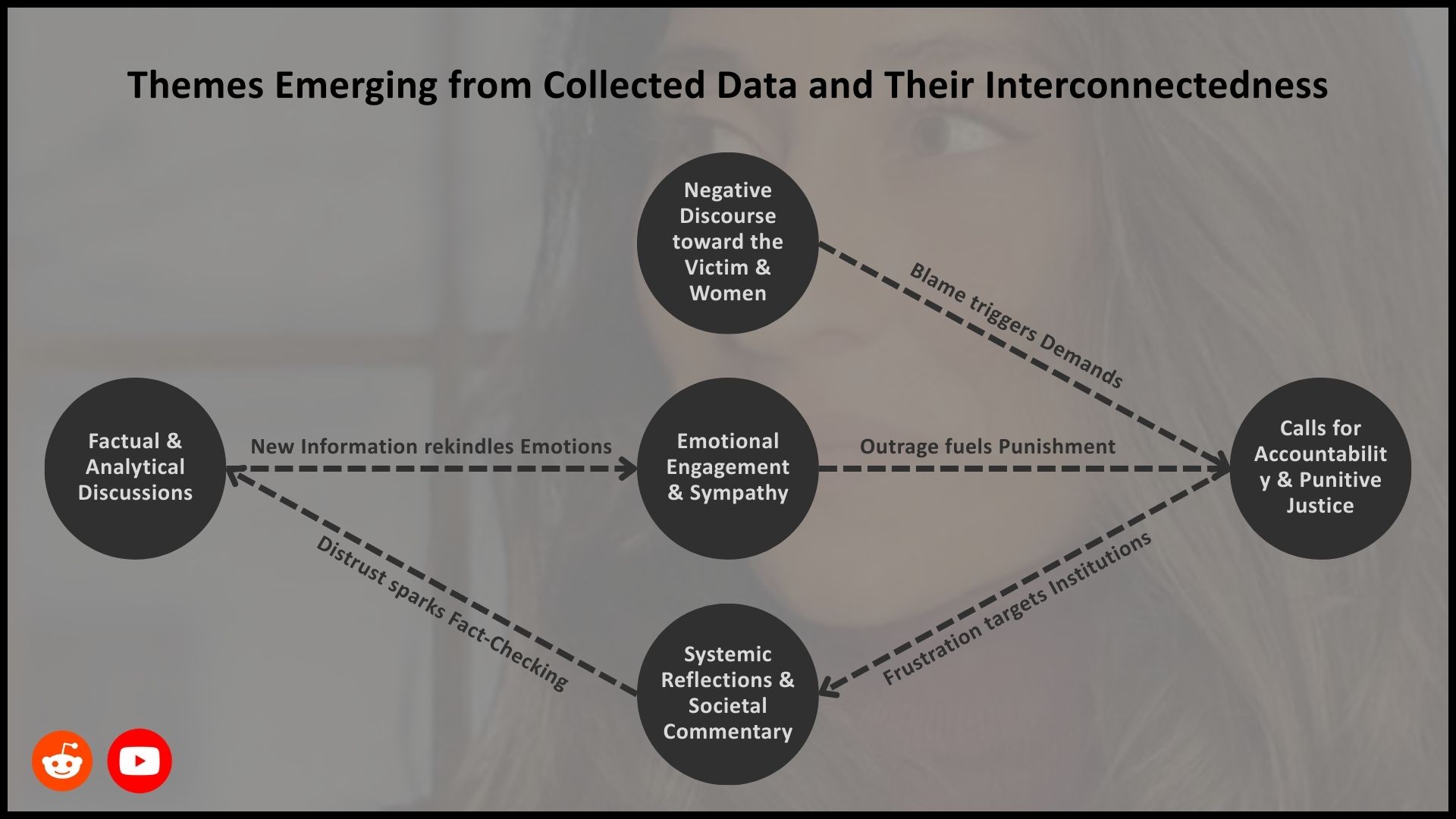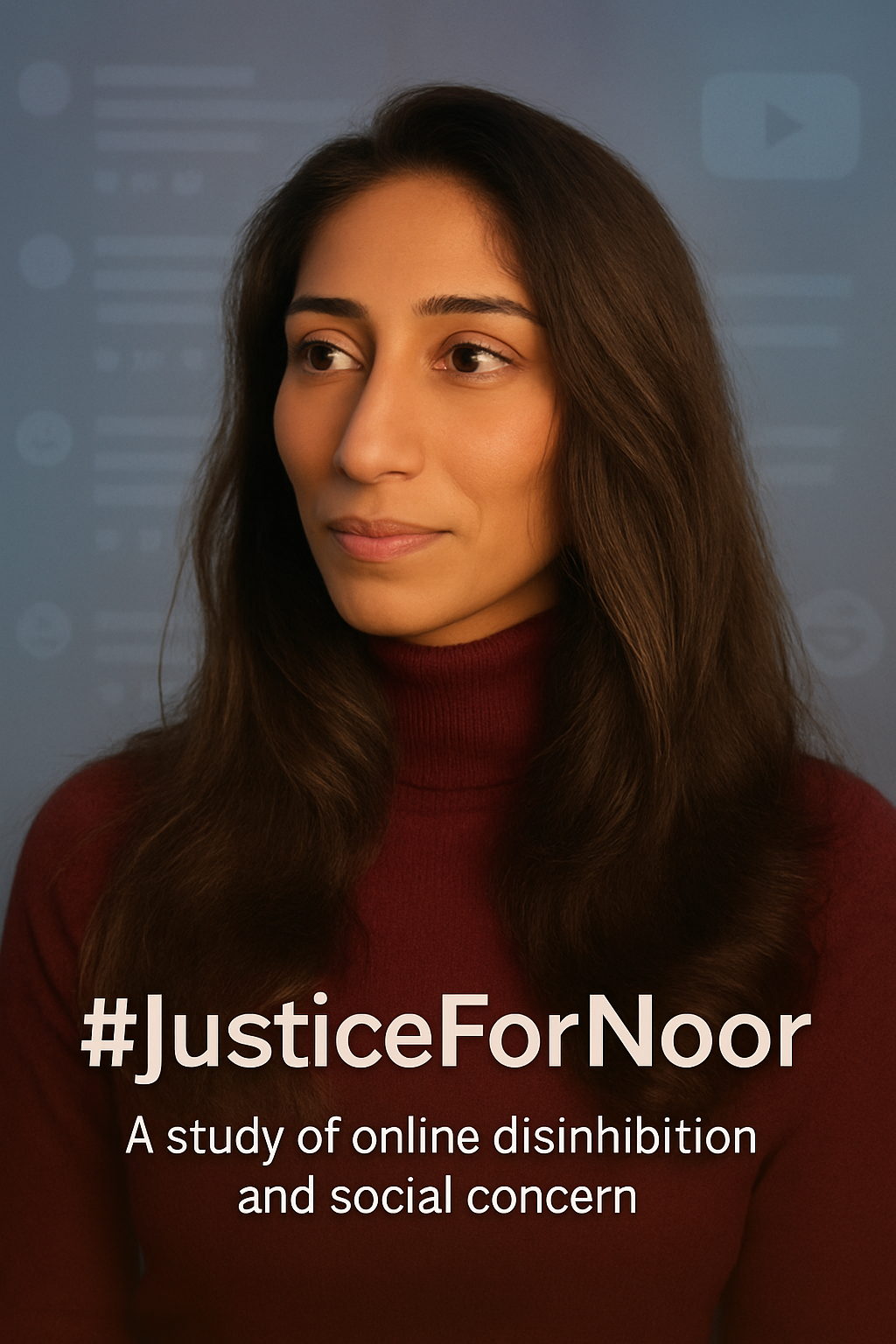
Saad Riaz
This project examines how online discourse surrounding the Noor Mukadam murder in Pakistan reflects digital disinhibition and social concern.
Analysing 1,618 comments from YouTube and Reddit, it explores how anonymity, platform culture, and moral outrage shape public responses to gender-based violence, using systematic sampling and reflexive thematic analysis.
Through thematic analysis, the study uncovers patterns of victim-blaming, demands for justice, systemic critique, and emotional expression. Uniquely grounded in a South Asian (more specifically Pakistani) context, it highlights how online spaces can both amplify harm and foster empathy, offering insights into culturally informed digital behaviour and moderation.


This project aimed to explore how Pakistani social media users responded to the murder of Noor Mukadam, a case that quickly went viral and prompted nationwide digital engagement. It focused on how online platforms facilitated discourse shaped by psychological and cultural dynamics.
The first objective was to investigate the role of the Online Disinhibition Effect (ODE). This involved examining how platform affordances and user anonymity contributed to polarised online discussions. The research explored whether users expressed more extreme, aggressive, or emotionally intense opinions in the digital space than they might in offline environments.
The second objective centred on the presence of social concern within online discourse. Specifically, the project asked whether users were more likely to express emotional reactions such as outrage, empathy, or grief, or whether they focused on instrumental responses like calls for legal reform, activism, or accountability.
By addressing these two questions, the project aimed to understand the psychological forces and platform-specific cultures that influence public engagement with gender-based violence in Pakistan. It sought to contribute to broader conversations about digital citizenship, ethical moderation, and the complex role of emotion and justice in online spaces.
The analysis revealed significant differences between platforms. YouTube comments often featured hostile, victim-blaming language and reflected widespread misogyny. Reddit discussions, on the other hand, tended to be more reflective, analytical, and critical of broader societal structures.
The findings supported the impact of the Online Disinhibition Effect, showing that anonymity and platform culture influenced both toxic and empathetic behaviours. On YouTube, minimal moderation and performative anonymity amplified emotionally charged and polarised speech. Reddit’s threaded discussions and community moderation encouraged more nuanced and civic-minded engagement.
Emotional expressions of social concern, such as anger, sympathy, and grief, appeared more frequently than direct calls for legal or social action. This suggests that users often process gender-based violence through shared emotional responses before taking concrete steps toward activism or reform.
An unexpected outcome was the extent to which platform design shaped discourse quality. Features like upvoting, comment visibility, and moderation tools played a crucial role in determining whether harmful or helpful narratives gained traction. These insights underline the need for culturally informed digital policies that support safer, more empathetic online communities.
This research examines how digital anonymity, platform affordances, and moral outrage shape online discourse surrounding the high-profile Noor Mukadam murder in Pakistan. Building on the Online Disinhibition Effect, which posits that anonymity can foster extreme behaviours, and Social Concern Theory, which emphasises empathy and collective activism, the study offers a culturally grounded view of public reactions to gender-based violence. Moral outrage in networked spaces can deepen polarisation, while emotionally charged debates may foster empathy but also fuel victim-blaming, shaped by socio-cultural norms. Comments from YouTube and Reddit were analysed using qualitative reflexive thematic analysis to assess variations in moderation practices and community norms. Ethical steps such as anonymising usernames and using incognito browsing helped reduce bias. Analysis revealed five core themes: negative discourse toward women and the victim, demands for justice, systemic critique, emotional engagement, and factual discussion. Platform differences were clear: YouTube showed harsher victim-blaming and moral policing, while Reddit users tended to offer more reflective, reform-oriented responses. These findings highlight the need for culturally sensitive moderation strategies and contribute to wider discussions on building safer, more empathetic digital environments.

Saad Riaz holds a BSc in Electrical and Computer Engineering from WPI in USA and an MSc in Cyberpsychology from IADT. After three years as an automation engineer, he transitioned into the field of psychology, working at a mental health clinic in Islamabad before joining an NGO focused on women’s mental health and gender dynamics in Pakistan.
His interdisciplinary background informs his interest in the psychological impact of technology, digital behaviour, and human connection. Saad is also a published writer in Pakistan whose work blends memoir and social commentary to explore empathy, identity, and collective healing. He continues to pursue research and advocacy that centre reflection, inclusivity, and meaningful dialogue.









